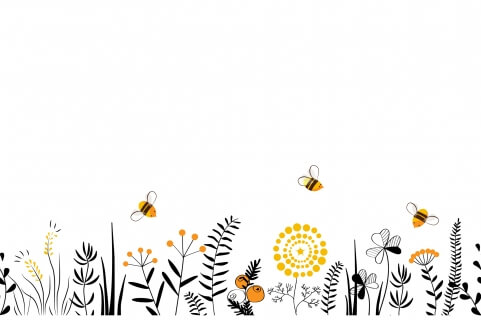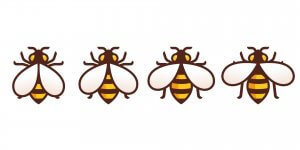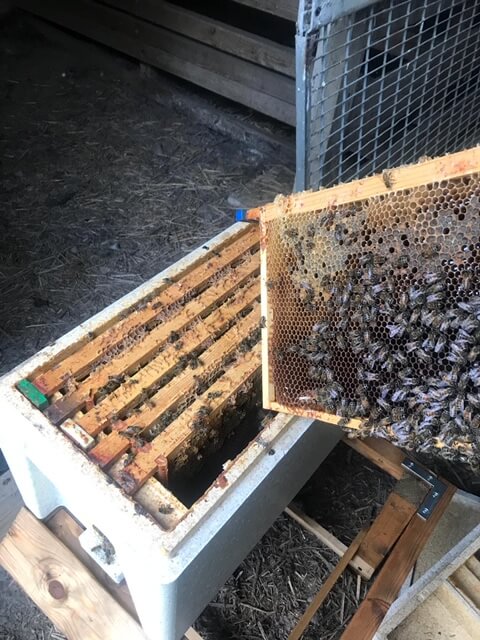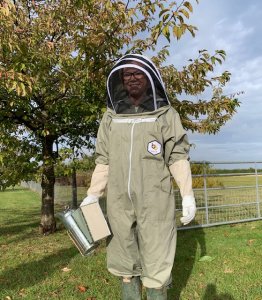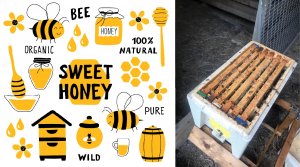Our head office team are all buzzing about our honeybees, and you might be too if you knew how important they were and how easy it is to keep them. In this article, we share our experience of beekeeping and offer you some advice to help you get started.
Beekeeping at Planteria
We take the environment and the stewardship of it very seriously. It’s our job to work with nature and improve workplaces across the UK, and this encourages us to understand the importance of natural habitats and how to protect them. Caroline works in our New Business team and she recently became our resident Beekeeper. Read Caroline’s blog below which includes tips and facts to inspire you.
Beekeeping at Planteria – by Caroline
It seems a little ironic to decide to become a beekeeper with a postage stamp for a garden. But, with my first nucleus hive just set up and prepped for winter, here’s how I started my beekeeping adventure.
I have always had a fascination with bees; they are remarkable insects! Every colony is a highly complex community made up of around 50,000 bees, each with a specific role to ensure the survival of the colony as a whole. Bees play an essential role in all ecosystems, pollinating most flowering plants, in turn serving all other animals, with around a third of human food-producing crops reliant on them.
The honey they produce boosts our immune system, provides protection from pollen allergies and has wound-healing benefits through its antibacterial properties. It is also a delicious and natural source of sugar which our bodies find easier to process. The bees produce honey to feed on and, more specifically, to store to ensure their survival through winter. Given enough nectar to forage, and somewhere to store it, they will keep producing it to excess all through the summer, which we can then extract.
There are approximately 44,000 amateur beekeepers registered across the UK, managing over a quarter million hives. Over the last few decades, most of the honeybees’ natural habitats have been destroyed, along with their food supply, so these managed hives make up most of the UK honeybee population today.
I had the opportunity to take part in a beginners’ beekeeping course run by my local beekeeping association. This involved six fascinating evening classes and a little hands-on experience with the bees and their honey. I really just wanted to learn more about bees and maybe lend a hand at the local apiaries. It created a lot of interest at work and I suggested we could have our own hive at Planteria.
We have a clear view of environmental issues and are proudly a zero-to-landfill site, alongside other positive changes like using hybrid vehicles to further limit our environmental impact. It wasn’t a stretch to think Planteria would be open to the idea of a little backyard beekeeping, and I have such amazing employers who not only thought it was a great idea – but they also covered the cost of bees, the hive and equipment too.
We are so lucky to have a rural office space with over an acre and a half of meadow. With it already home to our sheep and lots of chickens, the bees are barely noticeable and have lush hawthorn hedgerow and dandelions to forage from. Our year-round supply of office flowers, awaiting delivery to our customers, also provides a unique and diverse menu for our bees.
With any little luck, and despite my novice beekeeping skills, our bees will be producing honey from spring next year. In fact, if all goes to plan, I should be harvesting upward of 10kg honey from our single hive.
Starting Your Own Beehive and Supporting the Bees
We highly recommend meeting with your local beekeeping association who are experts at beekeeping and can support you with both knowledge and resources. They can give you lots of advice on the local species, how to build your own beehive and the cost of beekeeping.
Spring is the best time of the year to start beekeeping if you are starting from scratch, so prepare ahead. It is best to introduce bees to a new hive during spring, so they have the whole summer to forage and settle with a good stock of honey for winter. Plan to have all your equipment ordered during late autumn and installed before the end of winter so that you can order bees, get some training, and be fully prepared for their arrival.
There is a lot to think about when installing bees on your property; you’ll need to think about appropriate areas of shade, raising the hive to a good height so you can access it easily, and buying protective clothing to tend to your bees without getting stung. You may also want to get tested for allergies by your doctor before you go all-in on your beekeeping. There’s a lot to consider, so speak to your local beekeepers and refer to our blog for more stories about our real experiences with honeybees.

